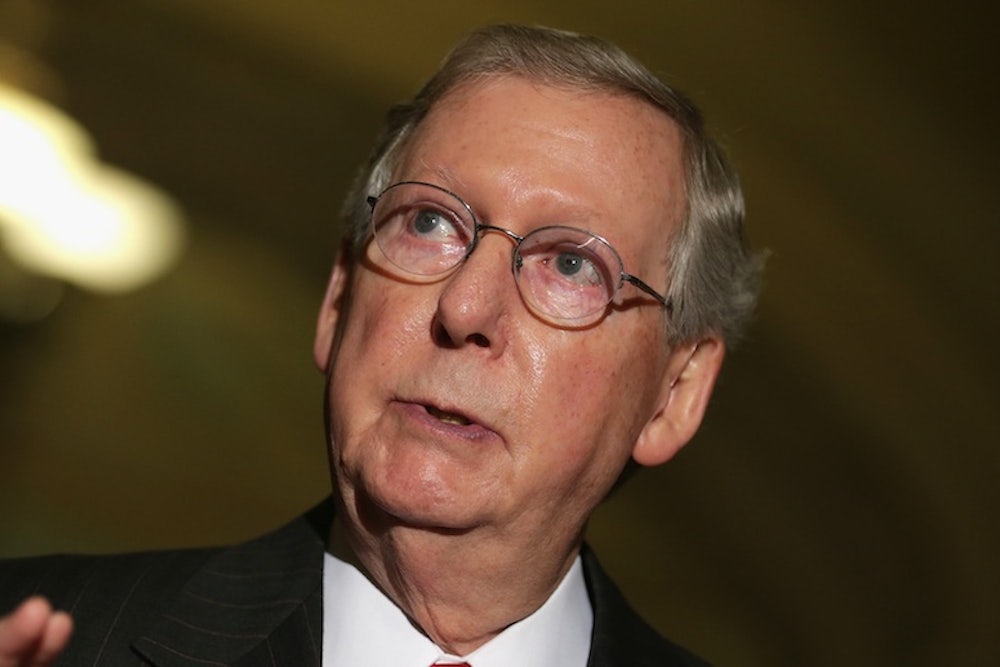Tuesday’s elections seemed to reward bad legislative behavior by the Republican Party—and, in particular, the incoming Senate Majority Leader, Mitch McConnell. But even for McConnell, success came at a price.
When Obama first took office, back in 2009, McConnell settled on a strategy of absolute obstruction. Neither he nor his Republican colleagues would cooperate with the White House on legislation. McConnell wasn’t exactly subtle about this and, after Republicans made big gains in the 2010 midterms, he announced in a speech to the Heritage Foundation that his primary political goal was to make Obama a one-term president.
Those comments raised a ruckus, but the strategic logic was sound. The inability to pass legislation, McConnell understood, would anger voters. President Obama would take the blame, McConnell figured, because people would hold the president, not Congress, responsible for gridlock.
That's a fair interpretation of what happened on Tuesday. Voters were frustrated with Washington dysfunction—particularly, as my colleague John Judis points out, the inability to address stagnant middle class wages. But Obama and the Democrats had plenty of policy ideas and, arguably, many of them would have made a difference. McConnell and his allies, including House Speaker John Boehner, simply refused to pass them.
As Matt Yglesias wrote Wednesday at Vox, McConnell's "master plan was simple — hang together and say no. And, by and large, it worked. McConnell is not the most charismatic politician of our time, but he is arguably the sharpest mind in contemporary politics on a strategic level."
Still, McConnell's strategy actually failed in two key respects. Republicans were able to stop Obama from legislating after those 2010 midterms. But, by that point, Obama had already passed major, sometimes historic pieces of legislation, including the Recovery Act and the Affordable Care Act. Cooperating with Obama would not have prevented these laws from passing, obviously. But, particularly with health care, it probably would have given Republicans leverage to shape the measures more to their liking.
That’s the first way McConnell’s strategy failed. And the second? Go back to that Heritage speech and listen closely to what McConnell identifies as his primary goal: It’s preventing Obama from winning reelection. That quite obviously didn’t happen. And that’s a big deal. Even without the ability to pass laws, Obama has been able to address issues like global warming and immigration with executive action. He’s also filled part of the judiciary and staffed federal agencies with lieutenants who share his priorities.
The ultimate impact of these actions depends on what happens in 2016. If Republicans manage to get control of the House and the Senate and the White House, they could undo some of what Obama and the Democrats have done over the last six years. But winning the presidency remains a demographic challenge for the Republicans and there are some changes even a unified Republican government couldn't make.
McConnell won a huge political victory on Tuesday. That doesn't mean he won big on policy, too.
—Jonathan Cohn
Election coverage in The New Republic:
The economy crushed the Democrats—and it will again if they don't shape up. (John Judis)
Democrats had a winning message in 2012—and promptly forgot it. (Alec MacGillis)
It’s up to you now, Hillary. (Brian Beutler)
National Review Says the GOP Senate shouldn’t bother governing. They’re right. (Danny Vinik)
The most female Congress ever will be terrible for women (Rebecca Leber)
The polls failed to predict a Republican landslide. Here’s why. (Sam Wang)
Democrats didn’t lose governor’s races because of a GOP wave. They lost because of bad candidate. (Alec MacGillis)
Tuesday’s election proved that North Carolina is the nation’s most competitive state. (Thomas Mills)
Why Kay Hagan’s defeat in North Carolina hurts the most. (Jason Zengerle)
Just how bad was voter suppression this election? (Naomi Shavin)
America’s worst mayor finally lost—because Democrats and Republicans teamed up against him. (Claire Groden)
Fusion’s election night coverage was like "The Daily Show" for people who think politics don’t matter. (Esther Breger)
The CIA’s favorite senator will soon be in charge of CIA oversight (Jessica Schulberg)
Pot is now legal in D.C.—just as long as you're not a federal employee. (Claire Groden)
The one thing Republicans and Democrats can get done will put you to sleep. (Danny Vinik)
Election coverage from elsewhere:
Democrats need to head back to the chalkboard. (Harold Meyerson, The American Prospect)
A Victory for What? (Andrew Sullivan, The Dish)
Democrats face a choice: Obstruction or annihilation. (Jonathan Chait, New York)
Democrats lost votes because economic anxiety is still high. (Greg Sargent, The Plum Line)
The big winner on Tuesday was obstruction. (Michael Tomasky, Daily Beast)
What the hell happened to the Democratic vote? (Ed Kilgore, TPM)
Why Scott Walker keeps winning. (Betsy Woodruff, Slate)
Republican victories are not the climate apocalypse many fear. (Andrew Freedman, Mashable)
West Virginians elected a teenager. (Kris Maher, Wall Street Journal)
The next rising star Republican? (Brett Logiurato, Business Insider)
Clips compiled by Claire Groden and Naomi Shavin
